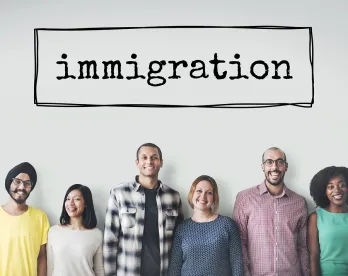Highlights
-
The USCIS settled a class-action lawsuit it faced from H-4, E, and L-2 dependent spouses regarding their authorized employment
-
L-2s and E spouses are now considered employment authorized “incident to status,” and EAD cards are not required to be considered work authorized, contingent on I-94 admission update from the USCIS
-
H-4 spouses will still need to rely on an EAD card issued by the USCIS for employment authorization
On Nov. 10, 2021, the U.S. Citizenship and Immigration Services (USCIS) settled a class-action lawsuit it was facing filed by eligible H-4, E, and L-2 dependent spouses challenging how the USCIS determined whether or not such individuals are authorized for employment. This settlement, along with the agency’s subsequent new policy memorandum, should reduce the likelihood of unpaid leaves of absence and loss of employment authorization due to bureaucratic delays.
The policy has created significant and acute hardships for individuals and employers over the last two years in particular, as USCIS processing times for these employment authorization documents (EADs) have ballooned from 90 days to upwards of a year at certain Service Centers.
At issue was the USCIS’s insistence that eligible H-4s, L-2s, and E dependent spouses, all of whom enjoy eligibility for employment authorization, must possess an actual work authorization card, or EAD, to be considered employment authorized. Such an interpretation has resulted in treating these individuals differently from some other categories of “nonimmigrants” who are temporarily employment authorized after an EAD expires and while a renewal is pending. For example, individuals with pending adjustment of status applications who apply to renew their employment authorization, students applying to renew their Optional Practical Training (OPT) based on the STEM OPT extension, and certain other defined categories of individuals are eligible to “auto-extend” their employment authorization for up to 180 days beyond the expiration of their current employment authorization card so long as they filed a timely renewal of this request.
By contrast, prior to this settlement, the USCIS has insisted that eligible H-4 spouses, L-2 spouses, and E spouses need to possess a valid EAD at all times to be considered employment authorized.
The USCIS’s position and these delays have resulted in multiple class action lawsuits. In the most recent, Shergill, et al. v. Mayorkas, the plaintiffs reached a settlement, with the USCIS making the following concessions:
-
L-2s are considered employment-authorized “incident to status,” which means that such individuals need not apply for or possess an EAD to be considered work authorized. The Department of Homeland Security (DHS) committed to taking steps within 120 days of the settlement to update I-94s (proof of lawful status) for such individuals to reflect such employment authorization, which would then allow them to satisfy I-9 requirements. In a subsequent policy memorandum, the DHS also stated that L-2s must possess an actual or pending EAD renewal to be considered employment authorized until it completes this I-94 update.
-
L-2s who currently have an expired EAD but also have a pending EAD renewal are authorized for employment based on the renewal. Once I-94s are updated to reflect such employment authorization, L-2s will no longer need EADs.
-
E spouse dependents are considered employment authorized “incident to status,” and will be treated the same as L-2 spouses with respect to employment authorization. Until I-94 updates are made, they will also similarly need to rely on a valid EAD or auto-extended EAD.
-
Unlike L-2 and E spouses, eligible H-4 spouses will still need to rely on an EAD. However, in circumstances where an H-4 has an I-94 that is valid beyond the expiration of an existing H-4 EAD and a pending EAD renewal in the same category that was filed before expiration of the existing EAD, that H-4 will also benefit from auto-extension of their employment authorization for up to 180 days.
Notably, the H-4 auto-extension policy has limitations – it will not benefit individuals who have a pending EAD and H-4 renewal when the existing EAD expires, as these individuals will not be able to demonstrate their H-4 statuses remain valid beyond the expiration of their existing EADs.
The USCIS’s delays in processing such H-4 and EAD renewals are being challenged in a companion class-action lawsuit, Edakunni, et al., v. Mayorkas. Nevertheless, the outcome of Shergill offers some relief to employment-authorized H-4 spouses and their employers, as an individual can also renew H-4 status by scheduling an appointment at a consulate, potentially allowing these individuals to re-enter the U.S. on an extended H-4 without accounting for lengthy USCIS processing timelines.
As a reminder, underlying eligibility for an H-4 EAD is limited to spouses of H-1B nonimmigrants who are either the principal beneficiary of an approved I-140 immigrant visa petition, or have been granted H-1B status under section 106(a) and (b) of the American Competitiveness in the Twenty-first Century Act of 2000, as amended by the 21st Century Department of Justice Appropriations Authorization Act.






 />i
/>i

